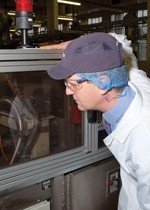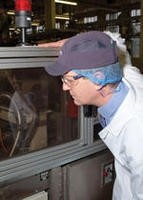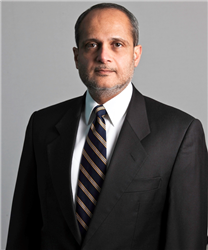At the gold mine

Dr Ian Clark, site manager, Tate & Lyle, Plaistow
I've always loved cooking. As students, we all cooked. We were probably the only group of blokes sharing a flat that cooked three course meals for each other almost every night - with wine ... It was fantastic!
Having said that, I don't remember having a burning ambition to work in the food industry when I was a student. I actually started my career in speciality chemical sales after doing a degree and a PhD in biochemical engineering.
I joined Tate & Lyle in 1992 after being offered a job on the environmental and health and safety side of the business. It was based in Greenwich, but with lots of European travel, so when I was offered the job of site manager at Lyle's Golden Syrup factory here [in Plaistow] in 2003, I took it, as my wife and I wanted to settle down and have kids.
My job is multifaceted. I am in charge of operations, but I am also heavily involved in sales, marketing and product development. It's general management, really. The site here is amazing - parts of it are incredibly hi-tech and parts of it look like a working museum. But if something works, why replace it?
For example, every can is tested on one of our three 12ft high bronze vacuum test wheels, which have been going since the late 1940s. These suck each can on to rubber pads and hold them in a vacuum. If there is any leak, the vacuum is lost and they fall off. They work really efficiently and don't require any maintenance, so why change them? They can also test more than 200 tins a minute.
Having pieces of kit this old does throw up some challenges though. We had a problem a few weeks ago when a bronze piston shaft on one of the filling machines failed. When this kind of thing happens, you can't just pick up a spare off the peg, you've got to reengineer it.
But we have also invested in cutting edge kit. Take printing. We now use a laser to burn tailored information for different export markets directly onto the standard tinplate, rather than holding stocks of plates for specific markets, or having to re-label tins. So if we suddenly change a distributor, we don't have to write off stock, we just reprogram the laser printer - which takes seconds. You just plug in a laptop and key in the text you want to use.
As for efficiency, we have made huge strides in the last five years. On changeover times, we've moved from eight hours to two or three. We've cut our water consumption by 30% in a three-year period. This has also reduced the energy bill, as if we're using less water to rinse off a column, there is less water to re-evaporate off the syrup, and so on.
We've also installed inline self-cleaning wedge wire filters so the guys here don't have to lift strainers out and manually clean and steam them all any more.
In terms of packaging, we've made significant savings just by standardising bottle caps, while the weight of steel we use in the cans is probably half what it used to be. The steel used to be softer, whereas now we can use harder thinner steel. We've also just flattened the top of the tins, so the weight loading when you pack them on pallets has moved from the cap to the body. This will enable us to reduce the thickness of the tin-plate even further - maybe by as much as 15%.
With packing, tray loading for the can lines is fully automated, but the bottle lines are semi-automated. However, volumes have been going up so automation is becoming financially viable now - there are opportunities to explore automatic tray loaders and bottle sorters or bottle blow moulders.
The history of Lyle's Golden Syrup is fascinating. It was founded by a Scotsman called Abram Lyle, who built a sugar refinery here in the 1880s. The syrup was a by-product he started selling off to employees. But it was so popular he started canning it in 1885 - which makes it the oldest unchanged packaging brand in the world: we're actually in the Guinness Book of Records!
There have been technical changes - for example, the tin used to be rolled inwards so the metal edge was touching the syrup, but today it's rolled outwards. In the First World War they made the tins out of cardboard due to steel shortages. The tins also used to be hand-soldered - at one point there were 60 women doing this with gas-fired soldering irons!
The production process is fairly straightforward. Tate & Lyle's Thames refinery processes raw brown cane sugar. Then, as part of the refining process, they crystallise out the white sugar and a co-product is runny sugar syrup or 'jet syrup', which is delivered to us in tankers, hot - or it would crystallise.
This is then inverted via acid hydrolysis to break it down into fructose and glucose. These are then blended back with some of the original sucrose syrup, which is why we call the end product partially inverted. After that it is neutralised with sodium bicarbonate to remove the acidity, filtered and treated with activated carbon to take out harsh notes and get the colour and flavour right - because the raw material varies, we have to constantly adjust the carbon levels to get a consistent colour. It's then evaporated, filtered and ready to can. To take off the water we're boiling it at 55-60?C under vacuum. You can't put golden syrup in a 20t vacuum pan and boil it.
== Tradition of taste ==
The composition actually hasn't changed since about 1890. In the first few years they tried to make it purer but they almost destroyed the market; it was too light, almost like castor oil. It was our 'New Coke' moment!
We have five different filling lines: two for tins, a polyethylene terephthalate bottling line, a glass jar line and a bulk containers line for catering. For joint venture partners (manufacturers) that produce co-branded products like popcorn, cake and ice cream, we can supply everything from 25kg to 25t. We are always looking for new partnerships. It starts off with us buying something we like and incorporating golden syrup into the recipe and seeing if it tastes nice! Then we will approach potential partners.
Other growth areas have been driven by packaging formats: bottle production has doubled in the last five years. We also introduced an upside-down bottle last autumn. Overall I'd say this plant has seen about 20% growth over that period, which is amazing as it is such an established brand. The key to growth is not raising brand awareness - everyone knows who we are - but finding new usage occasions and driving export sales. So if a celebrity chef uses our product in one recipe, sales can surge.
Pancake day is also a big opportunity. At the start of January, we went from a double shift to a three-shift operation on bottle production in five days to meet demand. But cans are more steady. It's a generation thing. Younger consumers don't feel the same nostalgia about dipping the spoon in and swirling it round. They just want to squirt and go.
When I joined, overall sales were pretty flat - so I'm really proud of what we've achieved. I'm also really proud of the team, many of whom have been here considerably longer than I have and know this plant inside out. I've probably got the most stable workforce in the industry.
People like working here. In six years I've only had to recruit for two positions. One was due to retirement and the other was to cover maternity leave. If there is a quiet couple of weeks, the guys will re-paint the canteen, the locker rooms or my office. There is a real sense of ownership. It's their plant.
----
FACTORY FACTS
Location: Tate & Lyle Plaistow, Knights Road, London E16 2AT. Tel: 020 7540 5175
Products: c40 stock keeping units, including Lyle's Golden Syrup in tins, bottles, jars and bulk catering packs, ice cream sauces and range of own-label syrups
Employees: 40
Throughput: c20,000t a year
Customers: Two-thirds UK market (retail, catering, manufacturing); one-third export
----
PERSONAL
Name: Dr Ian Clark
Age: 44
Career highlights: "Working on the Lyle's Golden Syrup moneybox tin in 2004. We double-capped the tin so after people had eaten it they could use it as a moneybox."
Domestic: Married with two children aged three and six
Outside work: Gardening, ski-ing, photography and collecting Tate & Lyle memorabilia: "I've got a cupboard full of old tins. I gave one full jar from the early 1940s to Heston Blumenthal so he could analyse the contents. The flavour gets much more intense and it really darkens with age, but it's very microbiologically stable. It's like a fine wine."














